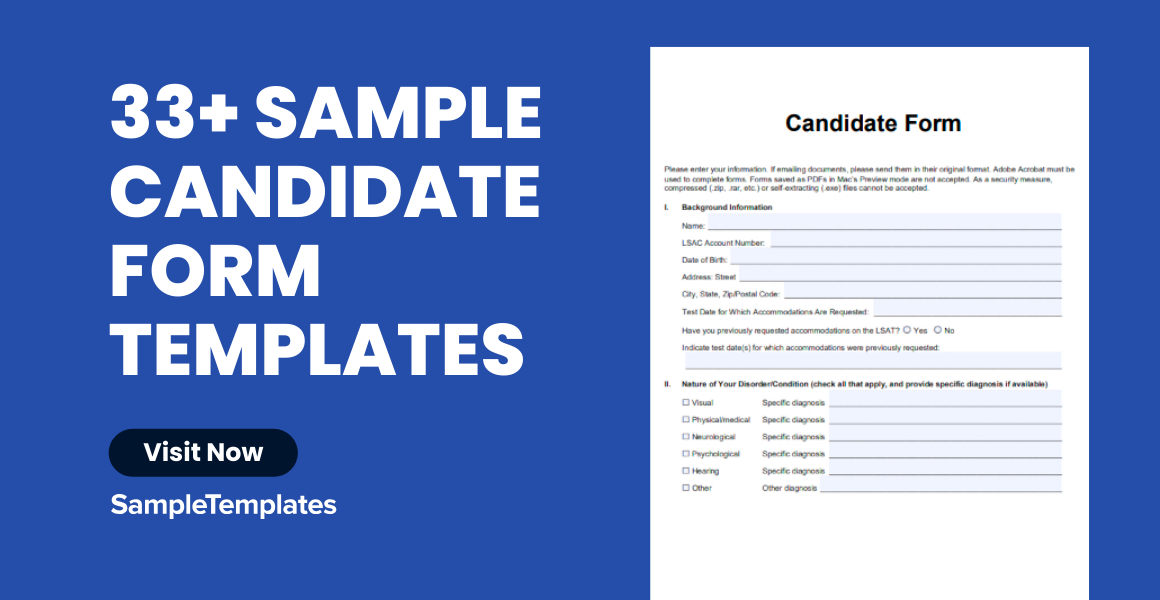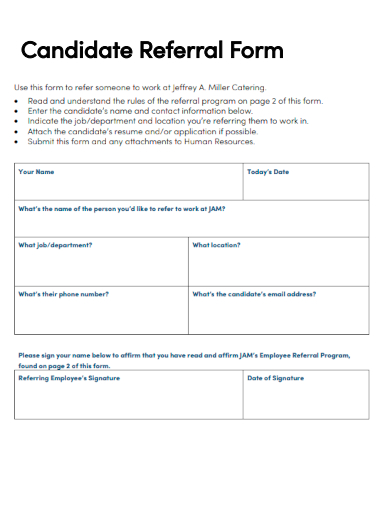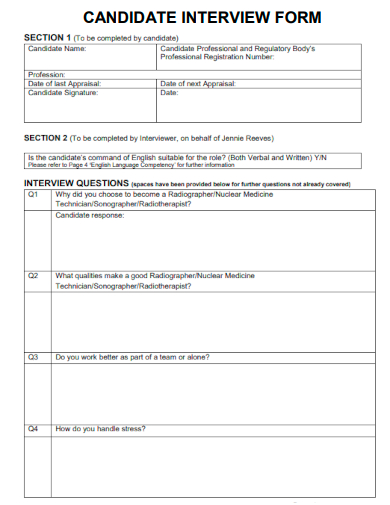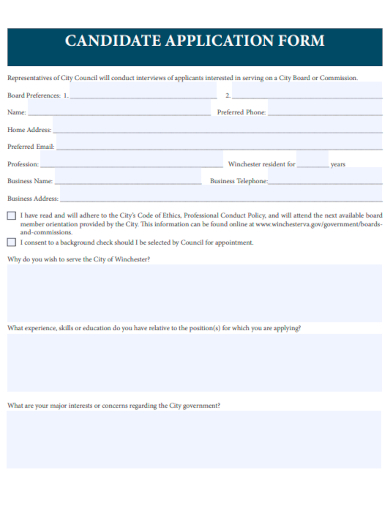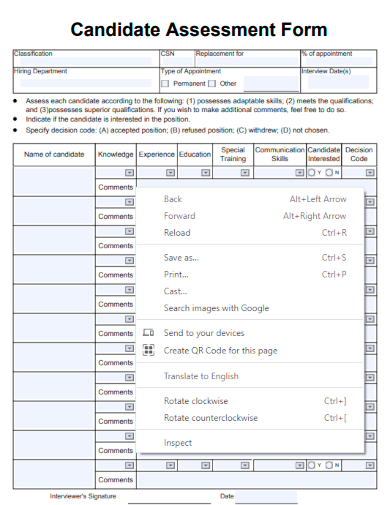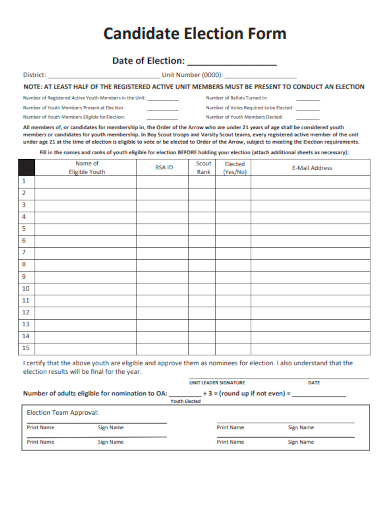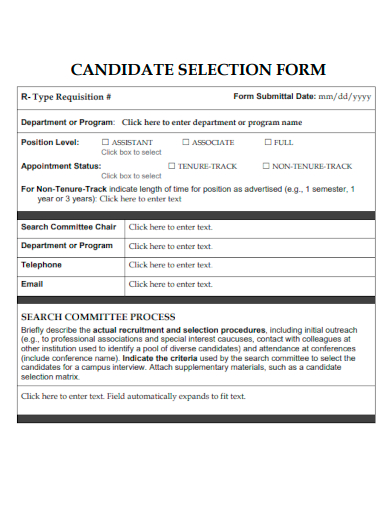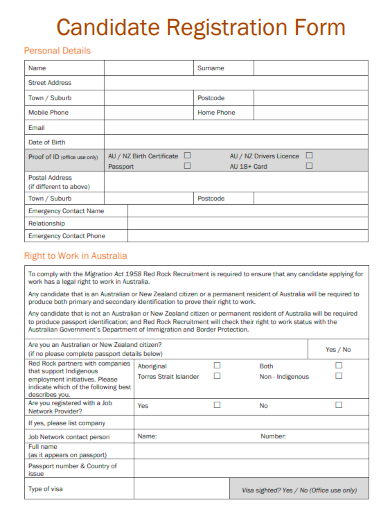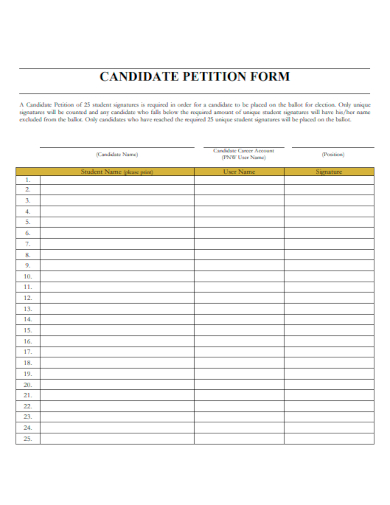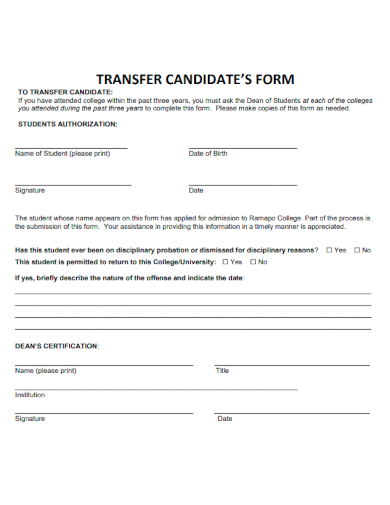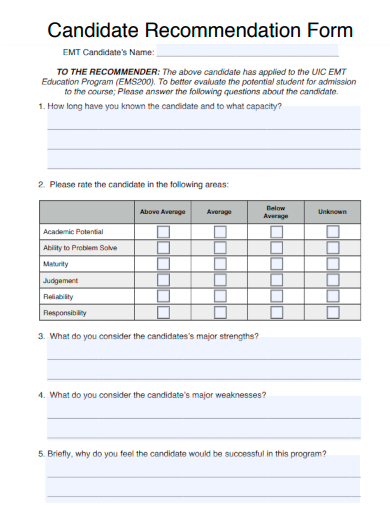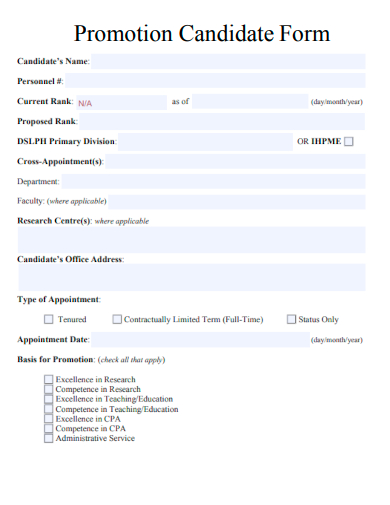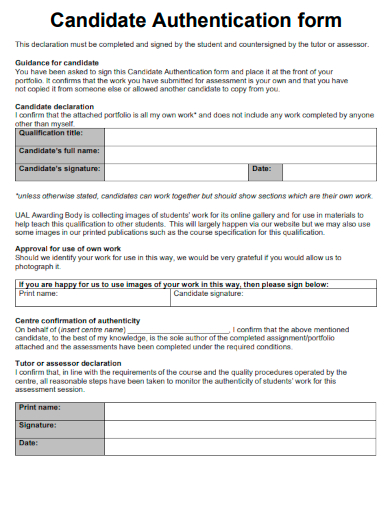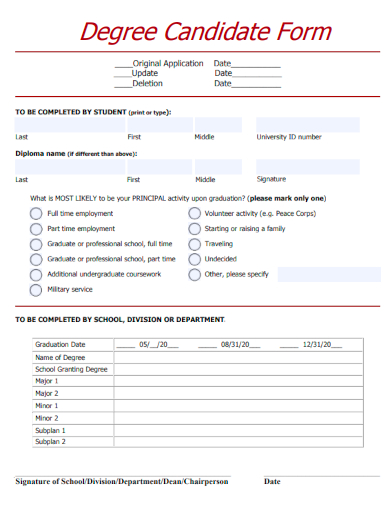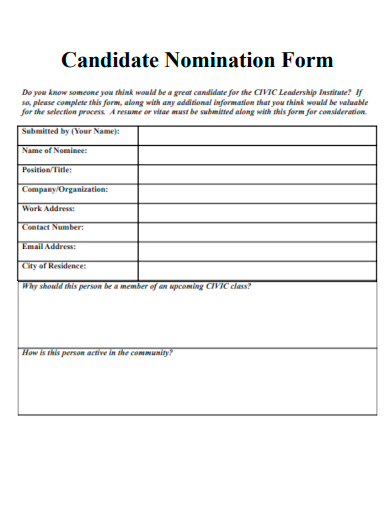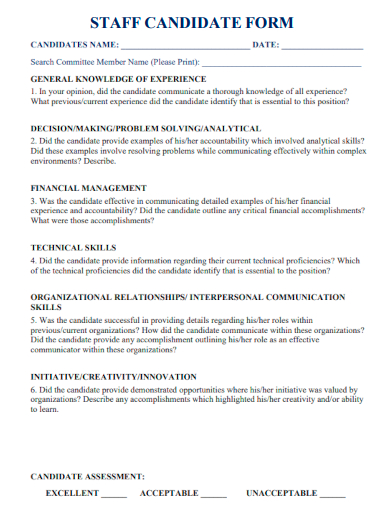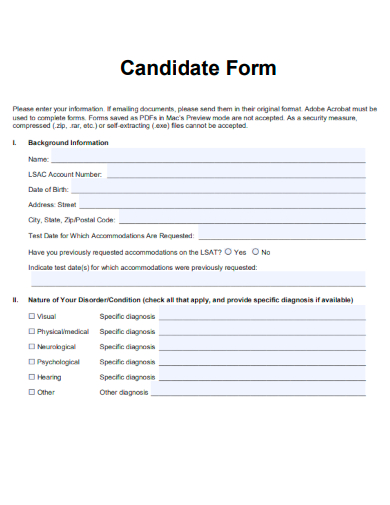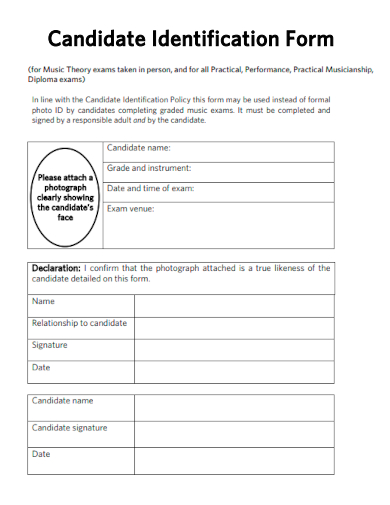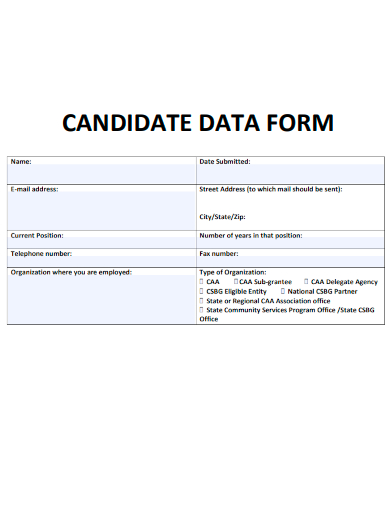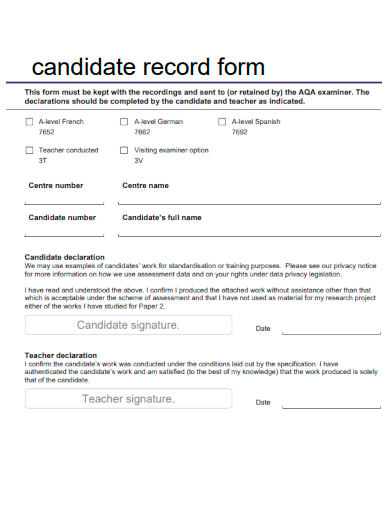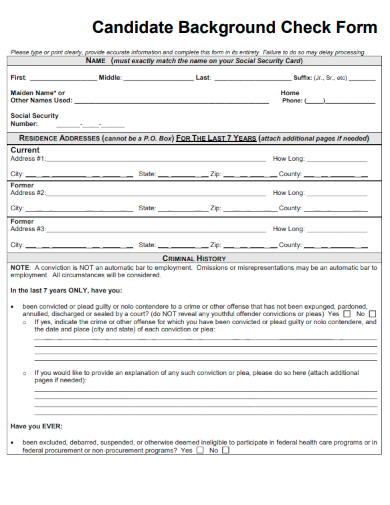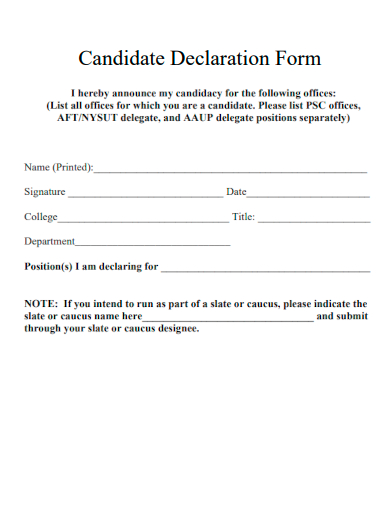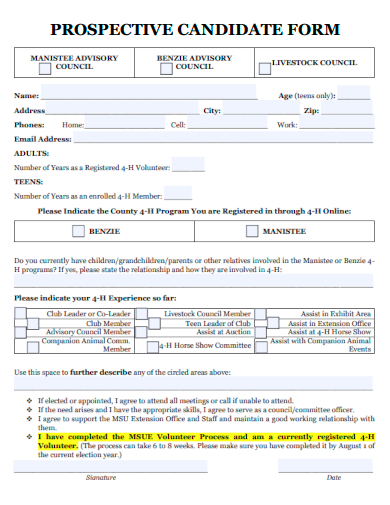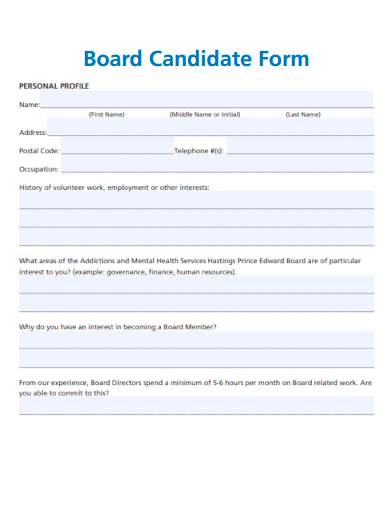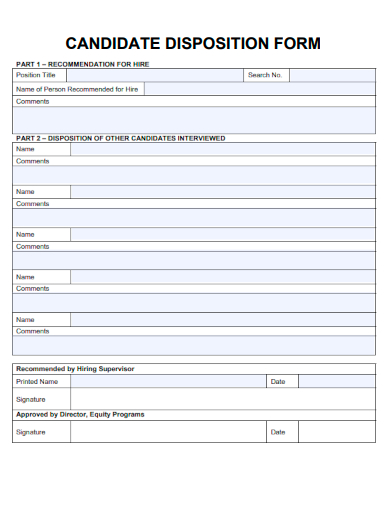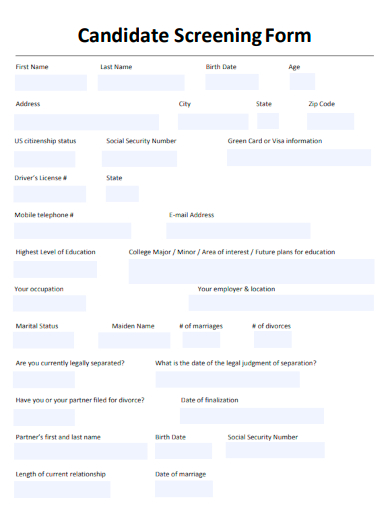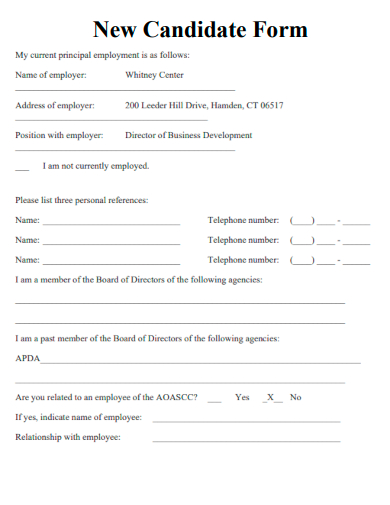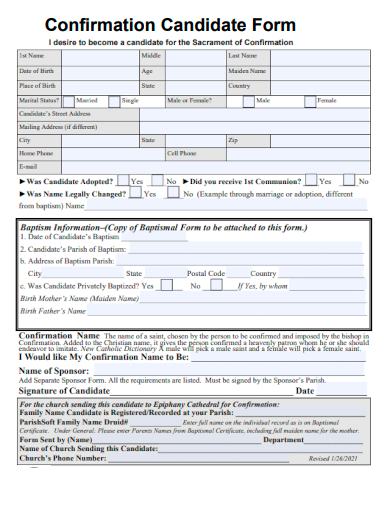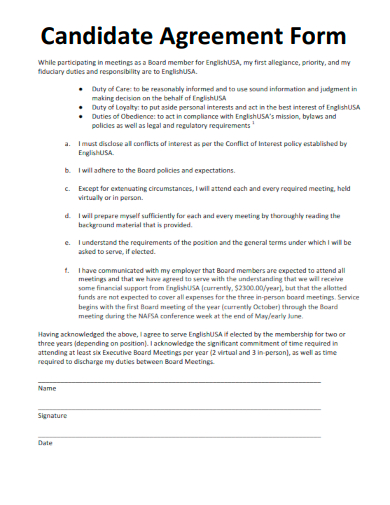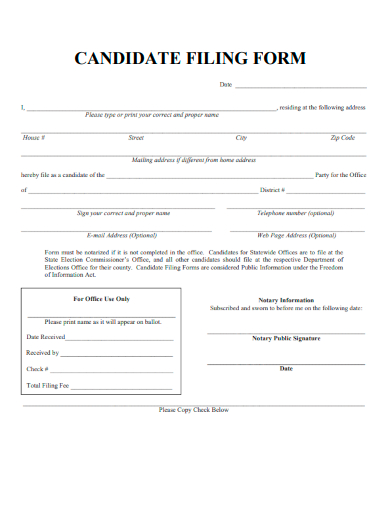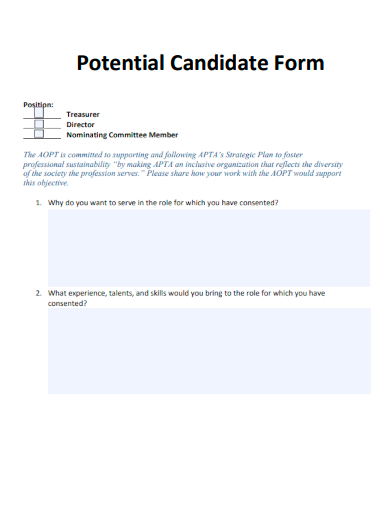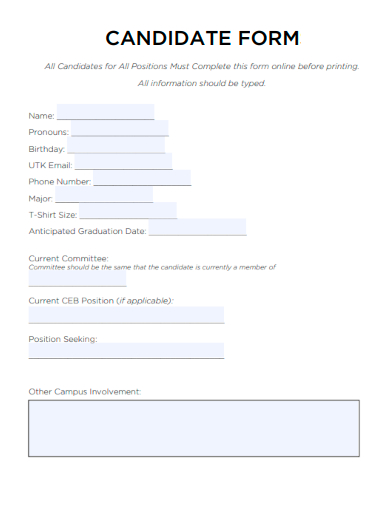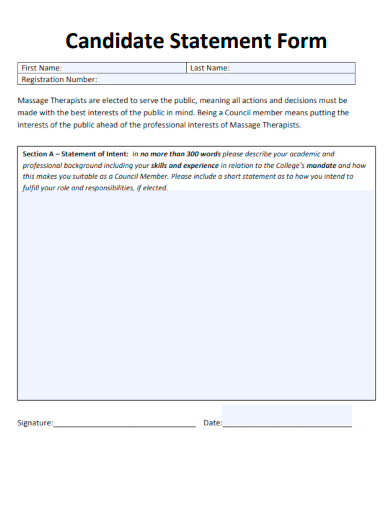Standing at the crossroads of a new career chapter or scouting for transformative roles? Dive into our comprehensive candidate evaluation form. Curated with precision, it’s designed to spotlight your talents, experiences, and career aspirations. This evaluation form acts as your beacon in the vast professional landscape, helping potential employers discern the brilliance you bring. Engage with it, showcase your prowess, and chart the course for your next professional milestone.
FREE 33+ Candidate Form Samples
1. Sample Candidate Evaluation Form Template
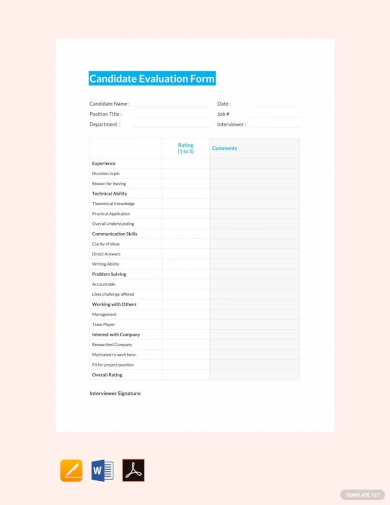
2. Sample Candidate Referral Form Template
3. Sample Candidate Interview Form Template
4. Sample Candidate Application Form Template
5. Sample Candidate Assessment Form Templates
6. Sample Candidate Election Form Template
7. Sample Candidate Selection Form Template
8. Sample Candidate Registration Form Template
10. Sample Candidate Petition Form Template
11. Sample Transfer Candidate’s Form Template
12. Sample Candidate Recommendation Form Template
How to Use Your Candidate Form
Before diving into the nitty-gritty of the candidate form, it’s essential to understand its objective. The sample form primarily serves as a systematic method to gather, evaluate, and streamline the information provided by potential candidates. It offers insights into their professional experiences, skills, and aspirations, thus facilitating informed decision-making during recruitment.
Gathering Basic Details
The top section of most candidate forms usually asks for basic details. This includes:
- Full Name
- Contact Information
- Current Role or Position
- Previous Employment
Encourage candidates to be precise and honest in this section as it establishes the foundation for the rest of the form.
Highlighting Professional Achievements
This section allows candidates to showcase their most significant accomplishments. It can be a mix of qualitative and quantitative achievements. For instance, “Managed a team of 15 and increased sales by 30% in the first quarter.”
Detailing Skills and Expertise
Here, candidates should list out their core competencies. Whether it’s proficiency in a particular software, a specific certification, or soft skills like leadership and communication, this section should encapsulate what they bring to the table.
Aspirations and Future Goals
Understanding a candidate’s future aspirations can help employers assess if there’s alignment with the company’s growth trajectory and if the candidate will be a long-term fit.
Submission and Follow-Up
Once the candidate form is filled out, there should be clear instructions on how to submit it. Post submission, ensure that there’s a system in place for acknowledgment. This can be an automated email or a manual follow-up, reassuring the candidate that their application is in process.
Why YOU Need a Candidate Evaluation Form for Interviews
Standardization in the Hiring Process
An evaluation form introduces a degree of uniformity in the hiring process. Every candidate is assessed based on the same set of criteria, minimizing biases and ensuring a fair evaluation.
Streamlined Decision Making
With all candidate information laid out in a structured format, decision-making becomes faster and more efficient. Hiring managers can easily compare and contrast candidates, making it simpler to shortlist potential fits.
In-depth Insight into Candidates
While sample resumes provide a snapshot of a candidate’s experiences, an evaluation form can delve deeper. It allows candidates to elaborate on their achievements, highlight specific skills, and discuss their future aspirations in detail.
Enhanced Communication Amongst Recruiters
If multiple people are involved in the hiring process, an evaluation form serves as a central document. It facilitates better communication, ensuring that everyone is on the same page regarding a candidate’s strengths and potential areas of improvement.
Feedback and Continuous Improvement
Post-interview, the evaluation form can also act as a feedback mechanism for candidates. Constructive feedback can help them understand areas they excelled in and areas that need attention. Additionally, feedback on the form itself can lead to continuous improvements in the recruitment process.
Legal and Compliance Benefits
In certain industries and regions, maintaining records of the hiring process is a legal requirement. Candidate evaluation forms serve as a documented history, ensuring that companies stay compliant and have a reference in case of any disputes or audits.
Future Reference
Even if a candidate isn’t a right fit now, situations change. Companies grow, roles evolve, and requirements shift. An evaluation form serves as a record, ensuring that promising candidates can be reconsidered for future roles.
13. Sample Promotion Candidate Form Template
14. Sample Candidate Authentication Form Template
15. Sample Degree Candidate Form Template
16. Sample Candidate Nomination Form Template
17. Sample Staff Candidate Form Template
18. Sample Candidate Form Blank Template
19. Sample Candidate Identification Form Template
20. Sample Candidate Data Form Template
21. Sample Candidate Record Form Template
22. Sample Candidate Background Check Form Template
23. Sample Candidate Declaration Form Template
24. Sample Prospective Candidate Form Template
25. Sample Board Candidate Form Template
26. Sample Candidate Disposition Form Template
27. Sample Candidate Screening Form Template
28. Sample New Candidate Form Template
29. Sample Confirmation Candidate Form Template
30. Sample Candidate Agreement Form Template
31. Sample Candidate Filing Form Template
32. Sample Potential Candidate Form Template
33. Sample Candidate Form Basic Template
34. Sample Candidate Statement Form Template
How to Customize Your Candidate Form
Before jumping into the customization of your candidate form, it’s essential to define what you aim to achieve. Are you looking to filter potential hires for a specific role? Or are you trying to build a talent pool for multiple vacancies? A well-defined objective will guide the customization process, ensuring that the form collects all the relevant details.
Selecting Appropriate Fields
Customization begins with selecting the fields that best resonate with the job requirements and company culture. A form for a tech startup may heavily focus on tech skills, coding languages, and project experiences, while one for a marketing agency might prioritize creativity, campaign experiences, and understanding of different marketing channels.
Include Role-specific Questions
To further tailor your form to the specific role you’re hiring for, include questions unique to that position. For instance, if you’re hiring a graphic designer, you might ask about their proficiency in specific design tools or request links to their portfolio.
Interactive Elements for Better Engagement
Modern candidate forms can incorporate interactive elements, such as drop-down menus, sliders, or even video introduction sections. These elements not only make the form more engaging but can also help in capturing richer, more detailed information from candidates.
Cultural and Value-based Questions
Customizing your form should also touch on the company’s culture. Questions like, “Describe a project where collaboration made a significant difference,” can provide insights into a candidate’s fit within the organizational culture.
Incorporate Feedback Mechanisms
A customizable feedback section allows candidates to provide input about the hiring process or ask questions about the role. This two-way communication can offer valuable insights to refine future recruitment drives.
Opt for Conditional Logic
Advanced candidate forms can utilize conditional logic, where certain questions appear based on previous answers. For instance, if a candidate mentions they have experience in digital marketing, subsequent questions could delve deeper into specific areas like SEO, PPC, or content marketing.
Ensure Mobile Compatibility
In today’s digital age, many candidates might access the form via mobile devices. Customizing your form means ensuring it’s mobile-responsive, providing a seamless experience across all device types.
Privacy and Data Security
Given the sensitive nature of the information, customization should also encompass security features. This includes encrypted data storage and clear disclaimers about how the data will be used.
Test and Refine
Customization is an ongoing process. Once you’ve tailored your candidate form, it’s essential to test it. Gather feedback from a small group before rolling it out widely. This ensures any glitches or unnecessary sections can be ironed out, resulting in a streamlined experience for all future candidates.
A well-customized candidate form not only captures the right information but also showcases the company’s professionalism and commitment to finding the best talent. With the right approach, these forms can be a powerful tool in the recruitment arsenal, ensuring both the candidates and the company benefit from the process.
Related Posts
Parent Consent Form Samples & Templates
Sample Release of Liability Forms
Sample Training Feedback Forms
Sample Sworn Affidavit Forms
Agreement Form Samples & Templates
Vehicle Inspection Forms Samples & Templates
Sample Employee Advance Forms
Sample Child Travel Consent Forms
Sample Testimonial Request Forms
Sample Employee Details Forms
Sample Divorce Forms
Sample Attestation Forms
Employee Performance Appraisal Form Templates
FREE 9+ Sample Presentation Evaluation Forms in MS Word
FREE 10+ School Admission Form Samples & Templates in MS Word | PDF
